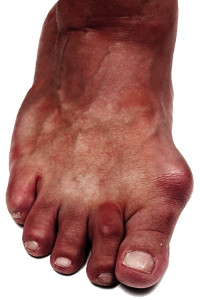Connect With Us
Blog
Items filtered by date: September 2018
Symptoms of Diabetic Foot Conditions
 If the body does not produce adequate insulin, a condition that is referred to as diabetes may possibly develop. The feet are often affected if this ailment should occur, and if left untreated it may become a serious matter. A condition that may arise from being diabetic is known as diabetic neuropathy. The symptoms may include a loss of sensation in the feet, which can cause difficulty in feeling any cuts, scrapes or blisters that may have developed. Additionally, peripheral vascular disease may be common among diabetic patients, and this may often be a result of changes that may occur in the blood vessels. If you are diabetic, it’s important to be aware of the changes that may occur in your feet. Please consider scheduling a consultation with a podiatrist so the toenails can be properly trimmed and additional information on how to take care of diabetic feet can be acquired.
If the body does not produce adequate insulin, a condition that is referred to as diabetes may possibly develop. The feet are often affected if this ailment should occur, and if left untreated it may become a serious matter. A condition that may arise from being diabetic is known as diabetic neuropathy. The symptoms may include a loss of sensation in the feet, which can cause difficulty in feeling any cuts, scrapes or blisters that may have developed. Additionally, peripheral vascular disease may be common among diabetic patients, and this may often be a result of changes that may occur in the blood vessels. If you are diabetic, it’s important to be aware of the changes that may occur in your feet. Please consider scheduling a consultation with a podiatrist so the toenails can be properly trimmed and additional information on how to take care of diabetic feet can be acquired.
Diabetic foot care is important in preventing foot ailments such as ulcers. If you are suffering from diabetes or have any other concerns about your feet, contact Dr. David Ungar from Personal Foot Care. Our doctor can provide the care you need to keep you pain-free and on your feet.
Diabetic Foot Care
Diabetes affects millions of people every year. The condition can damage blood vessels in many parts of the body, especially the feet. Because of this, taking care of your feet is essential if you have diabetes, and having a podiatrist help monitor your foot health is highly recommended.
The Importance of Caring for Your Feet
- Routinely inspect your feet for bruises or sores.
- Wear socks that fit your feet comfortably.
- Wear comfortable shoes that provide adequate support.
Patients with diabetes should have their doctor monitor their blood levels, as blood sugar levels play such a huge role in diabetic care. Monitoring these levels on a regular basis is highly advised.
It is always best to inform your healthcare professional of any concerns you may have regarding your feet, especially for diabetic patients. Early treatment and routine foot examinations are keys to maintaining proper health, especially because severe complications can arise if proper treatment is not applied.
If you have any questions please feel free to contact our office located in Farmington, MI . We offer the newest diagnostic and treatment technologies for all your foot and ankle needs.
Types of Foot Surgery
 If you should develop a bunion on the side of your big toe, you may want to consider permanent removal of this condition by having surgery performed. This particular procedure is referred to as an osteotomy, and may be effective in diminishing any pain that is associated with it. Additionally, a foot condition that is known as hammer toe may benefit by being surgically corrected. This type of surgery typically involves eliminating the joint appearing deformed, that is located between the toes, and may result in the toes becoming more flexible. Surgery that is referred to as an ankle fusion, may be beneficial in helping to heal ankle arthritis, which may be a result of a condition that is known as osteoarthritis. If you are afflicted with an Achilles tendon injury, surgery may be a reasonable option, which may eliminate the swelling and pain that is often associated with this ailment. If you are suffering from a severe foot malady, please consult with a podiatrist for a correct diagnosis and the best course of treatment, which may include surgery.
If you should develop a bunion on the side of your big toe, you may want to consider permanent removal of this condition by having surgery performed. This particular procedure is referred to as an osteotomy, and may be effective in diminishing any pain that is associated with it. Additionally, a foot condition that is known as hammer toe may benefit by being surgically corrected. This type of surgery typically involves eliminating the joint appearing deformed, that is located between the toes, and may result in the toes becoming more flexible. Surgery that is referred to as an ankle fusion, may be beneficial in helping to heal ankle arthritis, which may be a result of a condition that is known as osteoarthritis. If you are afflicted with an Achilles tendon injury, surgery may be a reasonable option, which may eliminate the swelling and pain that is often associated with this ailment. If you are suffering from a severe foot malady, please consult with a podiatrist for a correct diagnosis and the best course of treatment, which may include surgery.
Foot surgery is sometimes necessary to treat a foot ailment. To learn more, contact Dr. David Ungar of Personal Foot Care. Our doctor will assist you with all of your foot and ankle needs.
When Is Surgery Necessary?
Foot and ankle surgery is generally reserved for cases in which less invasive, conservative procedures have failed to alleviate the problem. Some of the cases in which surgery may be necessary include:
- Removing foot deformities like bunions and bone spurs
- Severe arthritis that has caused bone issues
- Cosmetic reconstruction
What Types of Surgery Are There?
The type of surgery you receive will depend on the nature of the problem you have. Some of the possible surgeries include:
- Bunionectomy for painful bunions
- Surgical fusion for realignment of bones
- Neuropathy decompression surgery to treat nerve damage
Benefits of Surgery
Although surgery is usually a last resort, it can provide more complete pain relief compared to non-surgical methods and may allow you to finally resume full activity.
Surgical techniques have also become increasingly sophisticated. Techniques like endoscopic surgery allow for smaller incisions and faster recovery times.
If you have any questions please feel free to contact our office located in Farmington, MI . We offer the newest diagnostic and treatment technologies for all your foot and ankle needs.
Symptoms and Causes of Bunions
 A foot condition that is referred to as a bunion is known as a bone disorder. It appears as a hard protrusion on the side of the big toe and may develop as a result of the bone structure that is out of alignment. The joint may begin to extend abnormally, and this may be caused by the second toe pushing against the big toe. There may be several reasons why people develop bunions, and these may include an injury that has occurred to the foot, different types of arthritis, low arches, or inherited traits. The symptoms that many patients experience may be a burning sensation, swelling on or around the afflicted joint, redness, or discomfort. Despite the fact that research has shown how wearing shoes that fit incorrectly do not cause bunions, the symptoms may be severely uncomfortable as a result of this. If you feel you have developed a bunion, it’s advised to seek the counsel of a podiatrist to discuss what treatments options are available for you.
A foot condition that is referred to as a bunion is known as a bone disorder. It appears as a hard protrusion on the side of the big toe and may develop as a result of the bone structure that is out of alignment. The joint may begin to extend abnormally, and this may be caused by the second toe pushing against the big toe. There may be several reasons why people develop bunions, and these may include an injury that has occurred to the foot, different types of arthritis, low arches, or inherited traits. The symptoms that many patients experience may be a burning sensation, swelling on or around the afflicted joint, redness, or discomfort. Despite the fact that research has shown how wearing shoes that fit incorrectly do not cause bunions, the symptoms may be severely uncomfortable as a result of this. If you feel you have developed a bunion, it’s advised to seek the counsel of a podiatrist to discuss what treatments options are available for you.
If you are suffering from bunions, contact Dr. David Ungar of Personal Foot Care. Our doctor can provide the care you need to keep you pain-free and on your feet.
What Is a Bunion?
A bunion is formed of swollen tissue or an enlargement of boney growth, usually located at the base joint of the toe that connects to the foot. The swelling occurs due to the bones in the big toe shifting inward, which impacts the other toes of the foot. This causes the area around the base of the big toe to become inflamed and painful.
Why Do Bunions Form?
Genetics – Susceptibility to bunions are often hereditary
Stress on the feet – Poorly fitted and uncomfortable footwear that places stress on feet, such as heels, can worsen existing bunions
How Are Bunions Diagnosed?
Doctors often perform two tests – blood tests and x-rays – when trying to diagnose bunions, especially in the early stages of development. Blood tests help determine if the foot pain is being caused by something else, such as arthritis, while x-rays provide a clear picture of your bone structure to your doctor.
How Are Bunions Treated?
- Refrain from wearing heels or similar shoes that cause discomfort
- Select wider shoes that can provide more comfort and reduce pain
- Anti-inflammatory and pain management drugs
- Orthotics or foot inserts
- Surgery
If you have any questions, please feel free to contact our office located in Farmington, MI . We offer the newest diagnostic and treatment technologies for all your foot care needs.
The Causes of An Ingrown Toenail
 An ingrown toenail is a painful and uncomfortable foot condition that is a result of the toenail growing into the skin. If left untreated it may produce serious complications, and this may be especially true of diabetic patients. There may be several causes of this condition occurring, including trimming the toenails improperly, inherited genetic traits, and wearing shoes and socks that do not fit correctly. For some people, if they have incurred an injury such as stubbing or jamming their toe, they may observe that an ingrown toenail may begin to develop. There are noticeable symptoms that typically occur with this ailment, including the skin surrounding the toe appearing red, pain and discomfort that is experienced when pressure is applied to the toe, in addition to pus or blood oozing from the toe. If you feel you have developed an ingrown toenail, it’s advised to consult with a podiatrist, who can perform any treatment options that is recommended for you.
An ingrown toenail is a painful and uncomfortable foot condition that is a result of the toenail growing into the skin. If left untreated it may produce serious complications, and this may be especially true of diabetic patients. There may be several causes of this condition occurring, including trimming the toenails improperly, inherited genetic traits, and wearing shoes and socks that do not fit correctly. For some people, if they have incurred an injury such as stubbing or jamming their toe, they may observe that an ingrown toenail may begin to develop. There are noticeable symptoms that typically occur with this ailment, including the skin surrounding the toe appearing red, pain and discomfort that is experienced when pressure is applied to the toe, in addition to pus or blood oozing from the toe. If you feel you have developed an ingrown toenail, it’s advised to consult with a podiatrist, who can perform any treatment options that is recommended for you.
Ingrown toenails may initially present themselves as a minor discomfort, but they may progress into an infection in the skin without proper treatment. For more information about ingrown toenails, contact Dr. David Ungar of Personal Foot Care. Our doctor can provide the care you need to keep you pain-free and on your feet.
Ingrown Toenails
Ingrown toenails are caused when the corner or side of a toenail grows into the soft flesh surrounding it. They often result in redness, swelling, pain, and in some cases, infection. This condition typically affects the big toe and may recur if it is not treated properly.
Causes
- Improper toenail trimming
- Genetics
- Improper shoe fitting
- Injury from pedicures or nail picking
- Abnormal gait
- Poor hygiene
You are more likely to develop an ingrown toenail if you are obese, have diabetes, arthritis, or have any fungal infection in your nails. Additionally, people who have foot or toe deformities are at a higher risk of developing an ingrown toenail.
Symptoms
Some symptoms of ingrown toenails are redness, swelling, and pain. In rare cases, there may be a yellowish drainage coming from the nail.
Treatment
Ignoring an ingrown toenail can have serious complications. Infections of the nail border can progress to a deeper soft-tissue infection, which can then turn into a bone infection. You should always speak with your podiatrist if you suspect you have an ingrown toenail, especially if you have diabetes or poor circulation.
If you have any questions, please feel free to contact our office located in Farmington, MI . We offer the newest diagnostic and treatment technologies for all your foot care needs.
